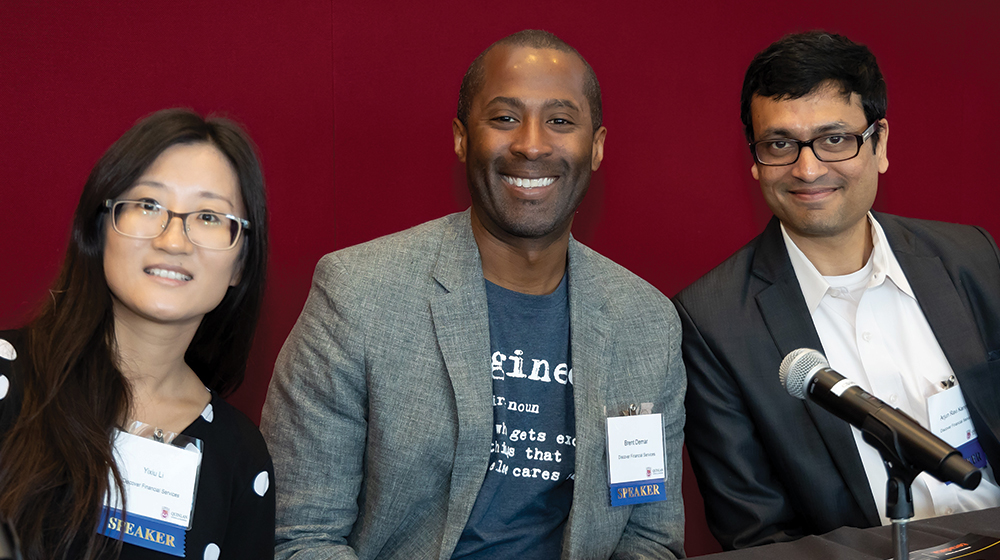Evolving AI: Navigating Risks and Opportunities in Financial Services
A recap of the 2024 conference: AI in the Financial Services Industry.
By Guillaume Bolivard and Jean-Marc Charles, Quinlan School of Business, Loyola University Chicago
If there is one thing the 2024 AI in the Financial Services Industry Conference made clear, it is that the landscape of artificial intelligence is continuously evolving, bringing new challenges and opportunities for businesses and academics alike. This year’s conference built on the success of last year’s event, diving deeper into essential topics such as model risk management, regulatory challenges, strategic AI deployment, and AI project evaluation. The insights shared by industry leaders, academics, and AI enthusiasts provided a comprehensive overview of the current state of AI and its future directions.

Agus Sudjianto, Former Executive VP, Head of Corporate Model Risk
Wells Fargo
Keynote highlights
Agus Sudjianto, a renowned expert in AI and machine learning, delivered a keynote address that set the tone for the conference. He emphasized the critical importance of robust performance metrics and validation in high-risk AI applications. Sudjianto’s assertion, “All models are wrong; some are useful. In real applications, when a model is wrong, it can create significant harm,” highlighted the necessity of understanding and preparing for potential model failures, especially in high-risk scenarios. He further elaborated, “We need to think about how models can fail and the conditions under which they might fail,” calling for a deeper examination of failure conditions to improve the robustness and reliability of AI models.
“All models are wrong; some are useful. In real applications, when a model is wrong, it can create significant harm.”
– Agus Sudjianto
Former Executive VP, Head of Corporate Model Risk
Wells Fargo

Yixiu Li, Director of Generative AI Modeling, Discover Financial Services; Brent Demar, VP of Decisioning Technology, Discover Financial Services; and Arjun Ravi Kannan, Director of Data Science Research, Discover Financial Services.
Panel discussion summaries
Gen AI for Process Improvement and Related Use Cases
Panelists:
- Gary Class, Industry Strategist for Financial Services, Teradata
- Donald High, Chief Data Scientist, Internal Revenue Service
- Ram Peddu, Chief Data & Analytics Officer for Risk and Finance, BMO Harris Bank
The panel discussed the transformative potential of Generative AI in financial services and highlighted how Generative AI is revolutionizing loan origination by significantly enhancing efficiency and accuracy. This has resulted in notable reductions in processing times and error rates. Emphasizing the need for aligning AI integration with business goals, managing organizational change, and ensuring high data quality, the panelists shared substantial productivity gains from AI co-pilots automating routine tasks, allowing employees to focus on higher-value activities. Best practices for evaluating and selecting AI projects to maximize ROI and align with strategic objectives were also shared. The session underscored the necessity of ethical considerations and regulatory compliance, with Gary Class noting, “Generative AI is transforming our loan origination processes, making them faster and more accurate.”
Blueprint for Success: Strategic AI Deployment in Financial Services
Panelists:
- Brent Demar, VP of Decisioning Technology, Discover Financial Services
- Arjun Ravi Kannan, Director of Data Science Research, Discover Financial Services
- Raghu Kulkarni, Chief AI Officer, Equifax
- Yixiu Li, Director of Generative AI Modeling, Discover Financial Services
The panel provided a detailed roadmap for strategic AI deployment in financial services. They addressed the development and feasibility assessment of potential AI use cases, stressing the importance of identifying valuable opportunities within the financial space. A significant highlight was the necessity of selecting and evaluating appropriate AI models and architectures to ensure successful implementation. The discussion included overcoming common challenges such as integrating AI into existing systems and ensuring regulatory compliance. Raghu Kulkarni aptly summarized, “Strategic AI deployment requires not only technical expertise but also a deep understanding of business objectives and regulatory landscapes.” The session highlighted the importance of scalability and robust model evaluation frameworks in driving business value.
Regulatory Environment and Cybersecurity Risk
Panelists:
- Loren Bushkar, Innovation Policy Expert, Federal Reserve
- Donna Murphy Acting Deputy Comptroller for Compliance Risk Policy, Office of the Comptroller of the Currency
- Steven Keith Platt, Director of Analytics and Lecturer of Applied AI, Loyola University Chicago
- Mark Canter, Center for Enhanced Cybersecurity, US Government Accountability Office
The panel explored the critical need for robust IT management and cybersecurity measures in the age of AI. The complexities of safeguarding sensitive data and computing infrastructure were addressed, with a focus on strategies to enhance the confidentiality, integrity, and availability of digital assets. Panelists discussed current regulatory frameworks and potential policy shifts needed to balance technological advancement with security imperatives. Key takeaways included the importance of proactive cybersecurity measures and integrating comprehensive risk management frameworks. Steven Keith Platt highlighted the need for anticipating future policy shifts to maintain robust cybersecurity defenses, emphasizing that continuous adaptation and innovation are crucial to protect against evolving threats. “Navigating the regulatory landscape requires not only understanding existing frameworks but also anticipating future policy shifts to maintain robust cybersecurity defenses,” he noted.
Challenges of Deploying AI in a Heavily Regulated Environment
Panelists:
- Arijit Das, SVP of Digital Asset Innovation, Northern Trust
- Doug Evanoff, Director of the Kaufman Center for Financial Policy Studies, Loyola University Chicago
- Jesus Gonzalez, Deputy Global Practice Leader, Aon’s Commercial Risk Group
- Sterling Thomas, Chief Scientist, US Government Accountability Office
The panel explored the complex landscape of integrating AI technologies within the heavily regulated banking sector. Establishing robust guardrails to prevent misuse and ensure that AI models operate within regulatory boundaries was a focal point. Practical challenges of securing sensitive financial data and adhering to evolving regulatory standards were discussed. The panel provided strategies for managing these hurdles to leverage AI’s transformative potential in banking. Jesus Gonzalez noted the importance of balancing innovation with stringent compliance measures, stating, “Deploying AI in a regulated environment requires a balance between innovation and stringent compliance measures.” The session underscored the necessity of aligning AI deployment with regulatory compliance, ensuring security and privacy, and developing frameworks to support AI innovation without compromising on compliance.
Navigating Model Risk from a Non-Bank and Third-Party Perspective
Panelists:
- Joe Decosmo, Chief Analytics and Technology Officer, Enova International
- Doug Hague, Executive Director and Professor of Practice, School of Data Science, UNC Charlotte
- Kathleen Maley, Vice President of Analytics, Experian
- David McMichael (Vice President and Actuary, Travelers Insurance Company
The panel addressed the complexities of managing model risk from a non-bank and third-party perspective. Topics ranged from handling validation requests from multiple banks to utilizing non-traditional data sources, both internal and external to large banks. The challenges of managing the ROI of a model while balancing the incremental benefits with the additional oversight required for changing or improving modeling techniques were discussed. Emphasizing the importance of robust model governance frameworks and continuous monitoring, Kathleen Maley remarked, “Managing model risk involves not just the technical aspects of the models but also understanding and mitigating the operational and regulatory impacts.” This session highlighted the necessity for comprehensive risk management practices and the integration of advanced data analytics to navigate the evolving landscape of model risk.

Sunder Pappu, Head of Technology Strategy, The Inland Real Estate Group
Breakout sessions
The breakout sessions at the 2024 Conference provided attendees with a more intimate and focused setting to delve into specific AI topics. These sessions were designed to foster in-depth discussions and hands-on learning experiences. They covered a range of topics from AI for Loan Origination and Managing Organizational Adoption of AI to AI Project Evaluation and Selection, Workflow Automation with CoPilots, and AI and Enterprise Risk Management. Attendees had the opportunity to engage with experts, explore case studies, and participate in interactive discussions, gaining practical insights and strategies that could be directly applied to their work.
One of the standout breakout sessions was on AI Project Evaluation and Selection, which I had the pleasure of attending. The session featured Sunder Pappu (Head of Technology Strategy, The Inland Real Estate Group) focusing on the best methods for evaluating and selecting AI projects to maximize success. Pappu emphasized the importance of aligning AI projects with strategic business goals and highlighted key criteria such as feasibility, value, and risk. He shared insights on how to effectively prioritize AI initiatives, ensuring they deliver tangible business benefits. A critical takeaway from this session was the necessity of a structured approach to project evaluation, which includes rigorous impact assessments and continuous monitoring to adapt to changing business needs. Pappu noted, “It’s essential to always make sure that AI is used to solve a specific problem, and the impact assessment helps in understanding the true value and risk associated with each project.”
About the authors

Guillaume Bolivard
Guillaume Bolivard, an MBA/MS in Finance candidate at Loyola University Chicago's Quinlan School of Business, combines extensive financial expertise with cutting-edge AI research. His career extends across roles in multinational corporations, investment banking, and central banking, with a focus on financial modeling, risk management, and equity derivatives. As a Graduate Researcher, Bolivard plays a key role in an AI project applying natural language processing to job postings, validating model accuracy for improved workforce development. His prior experience in Paris's financial sector, coupled with his athletic background as a national-level swimmer, demonstrates his resilience and discipline. Multilingual and possessing strong leadership skills, Bolivard is positioned at the forefront of finance and technology integration.

Jean-Marc Charles
Jean-Marc Charles is an accomplished central banking professional with over a decade of expertise in payment systems. Currently working in the fiduciary department of the Central Bank of Haiti as a Data Analyst, Jean-Marc specializes in analyzing and optimizing payment systems to enhance financial efficiency. He holds an Executive MBA and a Master’s degree in Digital Business Transformation, and he recently graduated with a Master’s in Business Data Analytics from Loyola University. A trilingual leader with a passion for excellence and a strong sense of responsibility, Jean-Marc is adept at leading cross-functional teams to achieve corporate objectives. His analytical and quantitative skills, combined with his deep understanding of digital business and data analytics, make him a pivotal figure in the ongoing transformation of Haiti’s financial sector.
A recap of the 2024 conference: AI in the Financial Services Industry.
By Guillaume Bolivard and Jean-Marc Charles, Quinlan School of Business, Loyola University Chicago
If there is one thing the 2024 AI in the Financial Services Industry Conference made clear, it is that the landscape of artificial intelligence is continuously evolving, bringing new challenges and opportunities for businesses and academics alike. This year’s conference built on the success of last year’s event, diving deeper into essential topics such as model risk management, regulatory challenges, strategic AI deployment, and AI project evaluation. The insights shared by industry leaders, academics, and AI enthusiasts provided a comprehensive overview of the current state of AI and its future directions.
Keynote highlights
Agus Sudjianto, a renowned expert in AI and machine learning, delivered a keynote address that set the tone for the conference. He emphasized the critical importance of robust performance metrics and validation in high-risk AI applications. Sudjianto’s assertion, “All models are wrong; some are useful. In real applications, when a model is wrong, it can create significant harm,” highlighted the necessity of understanding and preparing for potential model failures, especially in high-risk scenarios. He further elaborated, “We need to think about how models can fail and the conditions under which they might fail,” calling for a deeper examination of failure conditions to improve the robustness and reliability of AI models.
“All models are wrong; some are useful. In real applications, when a model is wrong, it can create significant harm.”
– Agus Sudjianto
Former Executive VP, Head of Corporate Model Risk
Wells Fargo
Panel discussion summaries
Gen AI for Process Improvement and Related Use Cases
Panelists:
- Gary Class, Industry Strategist for Financial Services, Teradata
- Donald High, Chief Data Scientist, Internal Revenue Service
- Ram Peddu, Chief Data & Analytics Officer for Risk and Finance, BMO Harris Bank
The panel discussed the transformative potential of Generative AI in financial services and highlighted how Generative AI is revolutionizing loan origination by significantly enhancing efficiency and accuracy. This has resulted in notable reductions in processing times and error rates. Emphasizing the need for aligning AI integration with business goals, managing organizational change, and ensuring high data quality, the panelists shared substantial productivity gains from AI co-pilots automating routine tasks, allowing employees to focus on higher-value activities. Best practices for evaluating and selecting AI projects to maximize ROI and align with strategic objectives were also shared. The session underscored the necessity of ethical considerations and regulatory compliance, with Gary Class noting, “Generative AI is transforming our loan origination processes, making them faster and more accurate.”
Blueprint for Success: Strategic AI Deployment in Financial Services
Panelists:
- Brent Demar, VP of Decisioning Technology, Discover Financial Services
- Arjun Ravi Kannan, Director of Data Science Research, Discover Financial Services
- Raghu Kulkarni, Chief AI Officer, Equifax
- Yixiu Li, Director of Generative AI Modeling, Discover Financial Services
The panel provided a detailed roadmap for strategic AI deployment in financial services. They addressed the development and feasibility assessment of potential AI use cases, stressing the importance of identifying valuable opportunities within the financial space. A significant highlight was the necessity of selecting and evaluating appropriate AI models and architectures to ensure successful implementation. The discussion included overcoming common challenges such as integrating AI into existing systems and ensuring regulatory compliance. Raghu Kulkarni aptly summarized, “Strategic AI deployment requires not only technical expertise but also a deep understanding of business objectives and regulatory landscapes.” The session highlighted the importance of scalability and robust model evaluation frameworks in driving business value.
Regulatory Environment and Cybersecurity Risk
Panelists:
- Loren Bushkar, Innovation Policy Expert, Federal Reserve
- Donna Murphy Acting Deputy Comptroller for Compliance Risk Policy, Office of the Comptroller of the Currency
- Steven Keith Platt, Director of Analytics and Lecturer of Applied AI, Loyola University Chicago
- Mark Canter, Center for Enhanced Cybersecurity, US Government Accountability Office
The panel explored the critical need for robust IT management and cybersecurity measures in the age of AI. The complexities of safeguarding sensitive data and computing infrastructure were addressed, with a focus on strategies to enhance the confidentiality, integrity, and availability of digital assets. Panelists discussed current regulatory frameworks and potential policy shifts needed to balance technological advancement with security imperatives. Key takeaways included the importance of proactive cybersecurity measures and integrating comprehensive risk management frameworks. Steven Keith Platt highlighted the need for anticipating future policy shifts to maintain robust cybersecurity defenses, emphasizing that continuous adaptation and innovation are crucial to protect against evolving threats. “Navigating the regulatory landscape requires not only understanding existing frameworks but also anticipating future policy shifts to maintain robust cybersecurity defenses,” he noted.
Challenges of Deploying AI in a Heavily Regulated Environment
Panelists:
- Arijit Das, SVP of Digital Asset Innovation, Northern Trust
- Doug Evanoff, Director of the Kaufman Center for Financial Policy Studies, Loyola University Chicago
- Jesus Gonzalez, Deputy Global Practice Leader, Aon’s Commercial Risk Group
- Sterling Thomas, Chief Scientist, US Government Accountability Office
The panel explored the complex landscape of integrating AI technologies within the heavily regulated banking sector. Establishing robust guardrails to prevent misuse and ensure that AI models operate within regulatory boundaries was a focal point. Practical challenges of securing sensitive financial data and adhering to evolving regulatory standards were discussed. The panel provided strategies for managing these hurdles to leverage AI’s transformative potential in banking. Jesus Gonzalez noted the importance of balancing innovation with stringent compliance measures, stating, “Deploying AI in a regulated environment requires a balance between innovation and stringent compliance measures.” The session underscored the necessity of aligning AI deployment with regulatory compliance, ensuring security and privacy, and developing frameworks to support AI innovation without compromising on compliance.
Navigating Model Risk from a Non-Bank and Third-Party Perspective
Panelists:
- Joe Decosmo, Chief Analytics and Technology Officer, Enova International
- Doug Hague, Executive Director and Professor of Practice, School of Data Science, UNC Charlotte
- Kathleen Maley, Vice President of Analytics, Experian
- David McMichael (Vice President and Actuary, Travelers Insurance Company
The panel addressed the complexities of managing model risk from a non-bank and third-party perspective. Topics ranged from handling validation requests from multiple banks to utilizing non-traditional data sources, both internal and external to large banks. The challenges of managing the ROI of a model while balancing the incremental benefits with the additional oversight required for changing or improving modeling techniques were discussed. Emphasizing the importance of robust model governance frameworks and continuous monitoring, Kathleen Maley remarked, “Managing model risk involves not just the technical aspects of the models but also understanding and mitigating the operational and regulatory impacts.” This session highlighted the necessity for comprehensive risk management practices and the integration of advanced data analytics to navigate the evolving landscape of model risk.
Breakout sessions
The breakout sessions at the 2024 Conference provided attendees with a more intimate and focused setting to delve into specific AI topics. These sessions were designed to foster in-depth discussions and hands-on learning experiences. They covered a range of topics from AI for Loan Origination and Managing Organizational Adoption of AI to AI Project Evaluation and Selection, Workflow Automation with CoPilots, and AI and Enterprise Risk Management. Attendees had the opportunity to engage with experts, explore case studies, and participate in interactive discussions, gaining practical insights and strategies that could be directly applied to their work.
One of the standout breakout sessions was on AI Project Evaluation and Selection, which I had the pleasure of attending. The session featured Sunder Pappu (Head of Technology Strategy, The Inland Real Estate Group) focusing on the best methods for evaluating and selecting AI projects to maximize success. Pappu emphasized the importance of aligning AI projects with strategic business goals and highlighted key criteria such as feasibility, value, and risk. He shared insights on how to effectively prioritize AI initiatives, ensuring they deliver tangible business benefits. A critical takeaway from this session was the necessity of a structured approach to project evaluation, which includes rigorous impact assessments and continuous monitoring to adapt to changing business needs. Pappu noted, “It’s essential to always make sure that AI is used to solve a specific problem, and the impact assessment helps in understanding the true value and risk associated with each project.”
